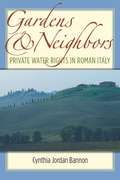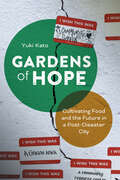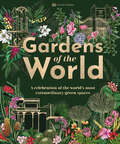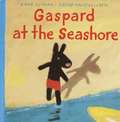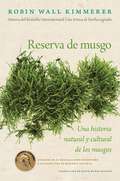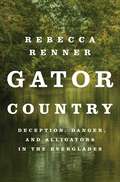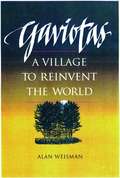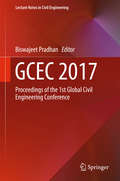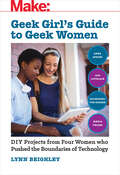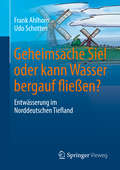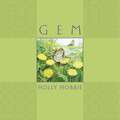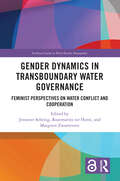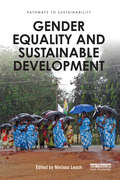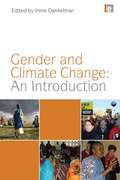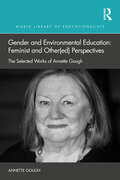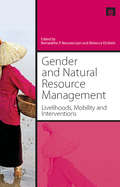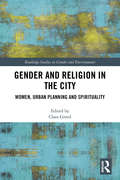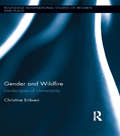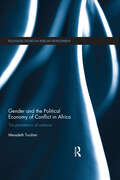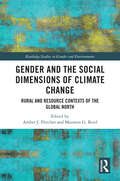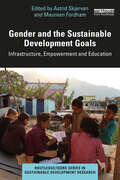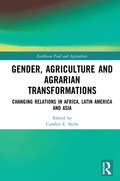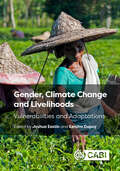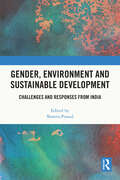- Table View
- List View
Gardens and Neighbors: Private Water Rights in Roman Italy
by Cynthia Jordan Bannon"Gardens and Neighborswill provide an important building block in the growing body of literature on the ways that Roman law, Roman society, and the economic concerns of the Romans jointly functioned in the real world." --Michael Peachin, New York University. As is increasingly true today, fresh water in ancient Italy was a limited resource, made all the more precious by the Roman world's reliance on agriculture as its primary source of wealth. From estate to estate, the availability of water varied, in many cases forcing farmers in need of access to resort to the law. In Gardens and Neighbors: Private Water Rights in Roman Italy, Cynthia Bannon explores the uses of the law in controlling local water supplies. She investigates numerous issues critical to rural communities and the Roman economy. Her examination of the relationship between farmers and the land helps draw out an understanding of Roman attitudes toward the exploitation and conservation of natural resources and builds an understanding of law in daily Roman life. An editor of the series Law and Society in the Ancient World, Cynthia Jordan Bannon is also Associate Professor of Classical Studies at Indiana University, Bloomington. Her previous book was The Brothers of Romulus: Fraternal Pietas in Roman Law, Literature, and Society(1997). Visit the author's website: http://www.iub.edu/~classics/faculty/bannon.shtml.
Gardens of Hope: Cultivating Food and the Future in a Post-Disaster City
by Dr. Yuki KatoSocial changes through urban gardening and farmingGardens are often spaces of hope, expected to solve many problems in a city including food insecurity and climate resilience. In fact, there has been a historical trend of urban gardening gaining popularity during times of crisis. Gardens of Hope is the story of urban gardening in New Orleans in the decade after Hurricane Katrina. Yuki Kato highlights the impact urban gardens have on communities after disasters and the efforts of well-intended individuals envisioning alternative futures in the form of urban farming.Drawing on repeated interviews with residents who began cultivation projects in New Orleans between 2005 and 2015, Kato explains how good intentions and grit were not enough to implement or sustain urban gardeners’ visions for the post-disaster city’s future. Coining the term “prefigurative urbanism,” Kato illustrates how individuals tried to realize alternative ways of living and working in the city through pragmatism and innovation. Gardens of Hope asks key questions about what inspires and enables individuals to pursue prefigurative urbanism and about the potential and limitations of this form of civic engagement to bring about short- and long-term changes in cities undergoing transformation, from gentrification, post-pandemic recovery, to climate change.
Gardens of the World
by DK EyewitnessExplore the world's most stunning gardens and gain expert knowledge that you can use in your own green space.A celebration of the world's most extraordinary green spaces, Gardens of the World will sow the seeds of adventure and inspire your next trip.Illustrated with inspiring photography and full of fascinating insights from expert gardeners, this beautiful compilation takes you on a visual journey of some of the world's most gorgeous gardens and green spaces. The ebook is split into five chapters, each focusing on a different theme. From the intricately planned and carefully curated French formal gardens of Versailles to the surrealist jungle dreamland of Mexico's Las Pozas, these gardens prove that green-fingered ingenuity comes in many forms and thrives in even the most unlikely of locations.
Gaspard at the Seashore
by Anne GutmanGaspard goes to summer camp at the beach in the hope of learning to windsurf, but soon discovers that he must first learn to swim.
Gathering Moss / Reserva de musgo (Spanish Edition): Una historia natural y cultural de los musgos
by Robin Wall KimmererEl extraordinario debut literario de Robin Wall Kimmerer, autora del bestseller internacional Una trenza de hierba sagradaViviendo en los límites de nuestra percepción ordinaria, los musgos son un elemento común del mundo natural, que sin embargo suele pasar desapercibido. Reserva de musgo es una fascinante mezcla de ciencia y reflexión personal que invita a los lectores a explorar y aprender de la vida elegante y sencilla de los musgos. En esta serie de ensayos personales encadenados entre sí, Robin Wall Kimmerer acompaña a sus lectores a comprender cómo viven los musgos y cómo sus vidas se entrelanzan con las de innumerables seres en el mundo natural, entre ellos, los seres humano. Con la precisión científica de su formación como botánica, Kimmerer explica la biología de los musgos con claridad y profundidad, al tiempo que, desde su experiencia como madre, maestra y mujer indígena, nos invita a reflexionar sobre lo que estos fascinantes y humildes organismos tienen para enseñarnos. Una historia natural y cultural que se convierte en una poderosa metáfora que nos ilumina otras maneras en las que podemos existir en el mundo.———The acclaimed literary debut of Robin Wall Kimmerer, author of the New York Times bestseller Braiding Sweetgrass.Living at the limits of our ordinary perception, mosses are a common but largely unnoticed element of the natural world. Gathering Moss is a beautifully written mix of science and personal reflection that invites readers to explore and learn from the elegantly simple lives of mosses.Robin Wall Kimmerer's book is not an identification guide, nor is it a scientific treatise. Rather, it is a series of linked personal essays that will lead general readers and scientists alike to an understanding of how mosses live and how their lives are intertwined with the lives of countless other beings, from salmon and hummingbirds to redwoods and rednecks. Kimmerer clearly and artfully explains the biology of mosses, while at the same time reflecting on what these fascinating organisms have to teach us.Drawing on her diverse experiences as a scientist, mother, teacher, and writer of Native American heritage, Kimmerer explains the stories of mosses in scientific terms as well as in the framework of indigenous ways of knowing. In her book, the natural history and cultural relationships of mosses become a powerful metaphor for ways of living in the world.Gathering Moss will appeal to a wide range of readers, from bryologists to those interested in natural history and the environment, Native Americans, and contemporary nature and science writing.
Gator Country: Deception, Danger, and Alligators in the Everglades
by Rebecca RennerA New York Times Editors' Choice"Delivers everything its title promises and much more." - NPR"Remarkable... Every species, and every person who fights for its continued existence, deserves a book like this." — The New York Times"This nail-biter account has the intensity of the best true crime... A high-def tale that ensnares you from the start." —PeopleDavid Grann meets Susan Orlean in this page-turning true story of an underground operation into the mysterious world of alligator poaching and its larger than life Floridian charactersTo catch a Florida Man, you have to become one, and that’s what Officer Jeff Babauta did. As his ponytailed, whiskey-soaked alter ego, he established Sunshine Alligator Farm. His goal? Infiltrate the shady world of illegal poachers in the Florida Everglades in order to protect the natural world.A head-spinning adventure soon unfolds. Jeff deals with glow-in-the-dark alligators and high-speed airboat rides, but quickly learns that not all poachers are villains. They’re simply people trying to survive, fighting against the poverty and greed holding them down. Jeff wants to solve the mystery of alligator poachers, and in doing so he must venture deeper into a strange ecosystem where right is wrong, and justice comes at the cost of those who’ve welcomed him into their world.Gator Country is the twisting true story of the impossible choices individuals must make to stay afloat in this world. Through its wholly unique blend of reporting, nature writing, and personal narrative, this book transports readers to vibrant and dangerous Florida landscapes and offers intimate portraits of those who call the region home. Broad in scope and vivid in detail, Gator Country is a fast paced tale of the risks people will take to survive in one of the world's most beautiful yet formidable landscapes and the undercover investigation that threatens to topple the whole scheme.
Gator or Croc?
by Allan FowlerFrom friendly dolphins to giant pandas, from icebergs and glaciers to energy from the sun, from magnets to solids, liquids, and gases, Rookie Read-About Science is a natural addition to the primary-grade classroom with books that cover every part of the science curricula. Includes: animals, nature, scientific principles, the environment, weather, and much more!
Gaviotas: A Village to Reinvent the World
by Alan WeismanThe story of Gaviotas, a village in a remote area of Colombia once thought uninhabitable, and the simple, affordable technology that was developed there and is now in use throughout Colombia.
Gcec 2017: Proceedings Of The 1st Global Civil Engineering Conference (Lecture Notes in Civil Engineering #9)
by Biswajeet PradhanThis book gathers the proceedings of the 1st Global Civil Engineering Conference, GCEC 2017, held in Kuala Lumpur, Malaysia, on July 25–28, 2017. It highlights how state-of-the-art techniques and tools in various disciplines of Civil Engineering are being applied to solve real-world problems. The book presents interdisciplinary research, experimental and/or theoretical studies yielding new insights that will advance civil engineering methods. The scope of the book spans the following areas: Structural, Water Resources, Geotechnical, Construction, Transportation Engineering and Geospatial Engineering applications.
Geek Girl's Guide to Geek Women
by Lynn BeighleyThis hands-on book takes a look at four brilliant women -- Ada Lovelace, Anna Atkins, Hildegard Von Bingen, and Maria Telkes -- and the world-changing innovations they created. Walk in their footsteps as you discover how these women became inventors, learn what inspired them, and then try your hand at recreating their most famous inventions -- computer programs, solar photography, codes and ciphers, and water purifiers.
Geheimsache Siel oder kann Wasser bergauf fließen?
by Frank Ahlhorn Udo SchottenThema des vorliegenden Buches ist der Umgang mit dem Wasser an der niedersächsischen Küste (hier: die Entwässerung der niedrig liegenden Landschaft), eine fundamentale Angelegenheit für die Menschen, die hier leben und arbeiten. Für ein junges Zielpublikum wird unterhaltsam erläutert, wohin das Wasser fließt und welche Anstrengungen unsere Vorfahren unternommen hatten, damit wir in dieser Landschaft (über)leben können. Darüber hinaus werden Veränderungen, die z. B. über den Klimawandel auf diese Landschaft einwirken, in die Entdeckungsreise der vier Protagonisten eingebunden.
Gem
by Holly HobbieLook carefully. There may be a gem in your garden.For nearly four decades, watercolorist Holly Hobbie has drawn inspiration from the wonders of nature. During one especially hard winter, she found herself imagining the story of a determined toad's spring journey. Her vivid depiction of this endearing creature's glorious yet fragile world is a sparkling celebration of survival and renewal. From the muddy brown road outside a farmhouse to the sweet-smelling garden to the cool lily pads in the pond, readers will feel their senses rejuvenated by Holly Hobbie's gemlike, detailed paintings in this nearly wordless work.
Gender Dynamics in Transboundary Water Governance: Feminist Perspectives on Water Conflict and Cooperation (Earthscan Studies in Water Resource Management)
by Jenniver Sehring Rozemarijn ter Horst and Margreet ZwarteveenThis volume assesses the nexus of gender and transboundary water governance, containing empirical case studies, discourse analyses, practitioners’ accounts, and theoretical reflections. Transboundary water governance exists at the intersection of two highly masculinised fields: diplomacy and water resources management. In both fields, positions are mainly held by men, and core ideas, norms, and guiding principles that are presented as neutral, are both shaped by men and based on male experiences. This book sheds light on the often hidden gender dynamics of water conflict and cooperation at the transboundary level and on the implicit assumptions that guide research and policies. The individual chapters of the book, based on case studies from around the world, reveal the gendered nature of water diplomacy, take stock of the number of women involved in organisations that govern shared waters, and analyse programmes that have been set up to promote women in water diplomacy and the obstacles that they face. They explore and contest leading narratives and knowledge that have been shaped mainly by privileged men, and assess how the participation of women concretely impacts the practices, routines, and processes of water negotiations. This volume will be of great interest to students and scholars of water governance, water diplomacy, gender, international relations and environmental politics. It will also be of interest to professionals and policymakers involved in supporting gender mainstreaming in water cooperation.
Gender Equality and Sustainable Development (Pathways to Sustainability)
by Melissa LeachFor pathways to be truly sustainable and advance gender equality and the rights and capabilities of women and girls, those whose lives and well-being are at stake must be involved in leading the way. Gender Equality and Sustainable Development calls for policies, investments and initiatives in sustainable development that recognize women’s knowledge, agency and decision-making as fundamental. Four key sets of issues - work and industrial production; population and reproduction; food and agriculture, and water, sanitation and energy provide focal lenses through which these challenges are considered. Perspectives from new feminist political ecology and economy are integrated, alongside issues of rights, relations and power. The book untangles the complex interactions between different dimensions of gender relations and of sustainability, and explores how policy and activism can build synergies between them. Finally, this book demonstrates how plural pathways are possible; underpinned by different narratives about gender and sustainability, and how the choices between these are ultimately political. This timely book will be of great interest to students, scholars, practitioners and policy makers working on gender, sustainable development, development studies and ecological economics.
Gender and Climate Change: An Introduction
by Irene DankelmanAlthough climate change affects everybody it is not gender neutral. It has significant social impacts and magnifies existing inequalities such as the disparity between women and men in their vulnerability and ability to cope with this global phenomenon. This new textbook, edited by one of the authors of the seminal Women and the Environment in the Third World: Alliance for the Future (1988) which first exposed the links between environmental degradation and unequal impacts on women, provides a comprehensive introduction to gender aspects of climate change. Over 35 authors have contributed to the book. It starts with a short history of the thinking and practice around gender and sustainable development over the past decades. Next it provides a theoretical framework for analyzing climate change manifestations and policies from the perspective of gender and human security. Drawing on new research, the actual and potential effects of climate change on gender equality and women's vulnerabilities are examined, both in rural and urban contexts. This is illustrated with a rich range of case studies from all over the world and valuable lessons are drawn from these real experiences. Too often women are primarily seen as victims of climate change, and their positive roles as agents of change and contributors to livelihood strategies are neglected. The book disputes this characterization and provides many examples of how women around the world organize and build resilience and adapt to climate change and the role they are playing in climate change mitigation. The final section looks at how far gender mainstreaming in climate mitigation and adaptation has advanced, the policy frameworks in place and how we can move from policy to effective action. Accompanied by a wide range of references and key resources, this book provides students and professionals with an essential, comprehensive introduction to the gender aspects of climate change.
Gender and Environmental Education: The Selected Works of Annette Gough (World Library of Educationalists)
by Annette GoughThis timely book provides a starting point for critical analysis and discourse about the status of gendered perspectives in environmental education research.Through bringing together selected writings of Annette Gough, it documents the evolving discussions of gender in environmental education research since the mid-1990s, from its origins in putting women on the agenda through to women’s relationships with nature and ecofeminism, as well as writings that engage with queer theory, intersectionality, assemblages, new materialisms, posthumanism and the more-than-human. The book is both a collection of Annette Gough, and her collaborators, writings around these themes and her reflections on the transitions that have occurred in the field of environmental education related to gender since the late 1980s, as well as her deliberations on future directions.An important new addition to the World Library of Educationalists, this book foregrounds women, their environmental perspectives, and feminist and other gendered research, which have been marginalised for too long in environmental education.
Gender and Natural Resource Management: Livelihoods, Mobility and Interventions
by Rebecca Elmhirst Bernadette P. ResurreccionThis book is about the gender dimensions of natural resource exploitation and management, with a focus on Asia. It explores the uneasy negotiations between theory, policy and practice that are often evident within the realm of gender, environment and natural resource management, especially where gender is understood as a political, negotiated and contested element of social relationships. It offers a critical feminist perspective on gender relations and natural resource management in the context of contemporary policy concerns: decentralized governance, the elimination of poverty and themainstreaming of gender. Through a combination of strong conceptual argument and empirical material from a variety of political economic and ecological contexts (including Cambodia, China, Indonesia, Malaysia, Nepal, Thailand and Vietnam), the book examines gender-environment linkages within shifting configurations of resource access and control. The book will serve as a core resource for students of gender studies and natural resource management, and as supplementary reading for a wide range of disciplines including geography, environmental studies, sociology and development. It also provides a stimulating collection of ideas for professionals looking to incorporate gender issues within their practice in sustainable development. Published with IDRC.
Gender and Religion in the City: Women, Urban Planning and Spirituality (Routledge Studies in Gender and Environments)
by Clara GreedThis book provides a conceptual, historical and contemporary context to the relationships between gender, religion and cities. It draws together these three components to provide an innovative view of how religion and gender interact and affect urban form and city planning. While there have been many books that deal with religion and cities; gender and cities; and gender and religion, this book is unique in bringing these three subjects together. This trio of inter-relationships is first explored within Western Christianity: in Roman Catholicism, Protestantism, Eastern Orthodoxy and in the Pentecostal and Charismatic movements. A wider perspective is then provided in chapters on the ways in which Islam shapes urban development and influences the position of Muslim women in urban space. While official religions have declined in the West there is still a desire for new forms of spirituality, and this is discussed in chapters on municipal spirituality and on the rise of paganism and the links to both environmentalism and feminism. Finally, ways of taking into account both gender and religion within the statutory urban planning system are presented. This book will be of great interest to those researching environment and gender, urban planning and sustainability, human geography and religion.
Gender and Wildfire: Landscapes of Uncertainty (Routledge International Studies of Women and Place #13)
by Christine EriksenIn pursuit of lifestyle change, affordable property, and proximity to nature, people from all walks of life are moving to the wildland-urban interface. Tragic wildfires and a predicted increase in high fire danger weather with climate change have triggered concern for the safety of such amenity-led migrants in wildfire-prone landscapes. This book examines wildfire awareness and preparedness amongst women, men, households, communities and agencies at the interface between city and beyond. It does so through an examination of two regions where wildfires are common and disastrous, and where how to deal with them is a major political issue: southeast Australia and the west coast United States. It follows women’s and men’s stories of surviving, fighting, evacuating, living and working with wildfire to reveal the intimate inner workings of wildfire response – and especially the culturally and historically distinct gender relations that underpin wildfire resilience. Wildfire is revealed as much more than a "natural" hazard – it is far from gender-neutral. Rather, wildfire is an important means through which traditional gender roles and power relations are maintained despite changing social circumstances. Women’s and men’s subjectivities are shaped by varying senses of inclusion, exclusion, engagement and disengagement with wildfire management. This leads to the reproduction of gender identities with clear ramifications for if, how and to what extent women and men prepare for wildfire.
Gender and the Political Economy of Conflict in Africa: The persistence of violence (Routledge Studies in African Development)
by Meredeth TurshenViolence affects the economy of production and the ecology of reproduction— the production of economic goods and services and the generational reproduction of workers, the regeneration of the capacity to work and maintenance of workers on a daily basis, and the renewal of culture and society through community relations and the education of children Gender and the Political Economy of Conflict in Africa explores the persistence of violence in conflict zones in Africa using a political economy framework. This framework employs an analysis of violence on both edges of the spectrum—a macro-economic analysis of violence against workers and a micro-political analysis of the violence in women’s reproductive lives. These analyses come together to create a new explanation of why violence persists, a new political economy of violence against women, and a new theoretical understanding of the relation between production and reproduction. Three case studies are discussed: the Democratic Republic of the Congo (violence in an era of conflict), Sierra Leone (violence post-conflict), and Tanzania (which has not seen armed conflict on the mainland). This book fills a significant gap on the political economy of war and women/gender for advanced undergraduate and postgraduate students as well as researchers in African Studies, Gender Studies, and Peace and Conflict Studies.
Gender and the Social Dimensions of Climate Change: Rural and Resource Contexts of the Global North (Routledge Studies in Gender and Environments)
by Amber J. Fletcher and Maureen G. ReedDispelling the myth that people in the Global North share similar experiences of climate change, this book reveals how intersecting social dimensions of climate change—people, processes, and institutions—give rise to different experiences of loss, adaptation, and resilience among those living in rural and resource contexts of the Global North. Bringing together leading feminist researchers and practitioners from three countries—Australia, Canada, and Spain—this collection documents gender relations in fossil fuel, mining, and extractive industries, in land-based livelihoods, in approaches for inclusive environmental policy, and in the lived experience of climate hazards. Uniquely, the book brings together the voices, expertise, and experiences of both academic researchers and women whose views have not been prioritized in formal policies—for example, women in agriculture, Indigenous women, immigrant women, and women in male-dominated professions. Their contributions are insightful and compelling, highlighting the significance of gaining diverse perspectives for a fuller understanding of climate change impacts, more equitable processes and strategies for climate change adaptation, and a more welcoming climate future. This book will be vital reading for students and scholars of gender studies, environmental studies, environmental sociology, geography, and sustainability science. It will provide important insights for planners, decision makers, and community advocates to strengthen their understanding of social dimensions of climate change and to develop more inclusive and equitable adaptation policies, plans, and practices.
Gender and the Sustainable Development Goals: Infrastructure, Empowerment and Education (Routledge/ISDRS Series in Sustainable Development Research)
by Astrid SkjervenThis book sheds light on the important and mostly neglected role that gender plays in achieving the UN Sustainable Development Goals, doing so by investigating three key problem areas: empowerment, education, and infrastructure. Starting with a theoretical and methodological framework, this edited collection contains 12 chapters from scholars and researchers from around the world. The book includes numerous case studies discussing the current status of gender equality relating to the SDGs. It reinforces the significance of gender for sustainable and just development, highlighting how women play a major role in work organization, disaster management, income, household maintenance, and mediation of knowledge. "Women" as a classification encompasses much diversity with many intersecting axes of difference; this book focuses on the excluded and disadvantaged majority social group, without imposing homogeneity on that categorization. Many chapters focus on critical situations occurring in the Global South, where these issues are highly prominent, and importantly, these contributions are written by local scholars. Finally, the volume provides pathways for basic and professional gender responsive education and innovation in the field. The book will generate important discussions in interdisciplinary research and higher education settings focusing on sustainable development, gender, equality, human rights, and education.
Gender, Agriculture and Agrarian Transformations: Changing Relations in Africa, Latin America and Asia (Earthscan Food and Agriculture)
by Carolyn E. SachsThis book presents research from across the globe on how gender relationships in agriculture are changing. In many regions of the world, agricultural transformations are occurring through increased commodification, new value-chains, technological innovations introduced by CGIAR and other development interventions, declining viability of small-holder agriculture livelihoods, male out-migration from rural areas, and climate change. This book addresses how these changes involve fluctuations in gendered labour and decision making on farms and in agriculture and, in many places, have resulted in the feminization of agriculture at a time of unprecedented climate change. Chapters uncover both how women successfully innovate and how they remain disadvantaged when compared to men in terms of access to land, labor, capital and markets that would enable them to succeed in agriculture. Building on case studies from Africa, Latin America and Asia, the book interrogates how new agricultural innovations from agricultural research, new technologies and value chains reshape gender relations. Using new methodological approaches and intersectional analyses, this book will be of great interest to students and scholars of agriculture, gender, sustainable development and environmental studies more generally.
Gender, Climate Change and Livelihoods: Vulnerabilities and Adaptations
by Margaret Alston Salim Momtaz Elizabeth Bryan Muhammad Asaduzzaman Nahid Rezwana Aden Aw-Hassan Elisabeth Garner Patricia E. Perkins Agnes Babugura Bipasha Baruah Abderrahim Bentaibi Quinn Bernier Yvonne Braun Boubaker Dhehibi Diana Hummel Zobaidul Kabir Edward Kato Francis Mwesigye Dina Najjar Balikisu Osman Elizabeth Opiyo Onyango Shahreen ShehwarThis book applies a gendered lens to evaluate the dynamic linkages between climate change and livelihoods in developing countries. It examines how climate change affects women and men in distinct ways, and what the implications are for earning income and accessing the natural, social, economic, and political resources required to survive and thrive. The book's contributing authors analyze the gendered impact of climate change on different types of livelihoods, in distinct contexts, including urban and rural, and in diverse geographic locations, including Asia, Africa and the Caribbean. It focuses on understanding how public policies and power dynamics shape gendered vulnerabilities and impacts, how gender influences coping and adaptation mechanisms, and how civil society organizations incorporate gender into their climate advocacy strategies. This book: -Provides cutting-edge scholarship on an underrepresented area of climate change: the gendered impacts of climate change on livelihoods. -Covers a range of different types of livelihoods and geographic locations. -Involves contributors from a diverse array of cultural and scholarly backgrounds, bringing contrasting perspectives to the topic. This book is recommended for scholars, students, and practitioners who study or work in fields such as climate change, gender, livelihoods, public policy, economic development, and agriculture.
Gender, Environment and Sustainable Development: Challenges and Responses from India
by Shweta PrasadThis book studies environment and sustainable development from the perspective of gender. It focuses on three major themes, including sustainability of development practices, policy perspectives on environmental management and climate change and its gendered impact. It includes contributions from academicians working across disciplines and practitioners working at the grassroots levels. The book addresses issues facing India amid a growing global environmental crisis and suggests policy measures for environmental protection and to improve the quality of life of its inhabitants. Lucid and topical, the volume will be an indispensable resource for students, researchers of gender, environment and sustainable development, sociology and public policy. It will also be a great resource for advocacy groups, non-governmental organisations (NGOs) and policymakers working in the area.
